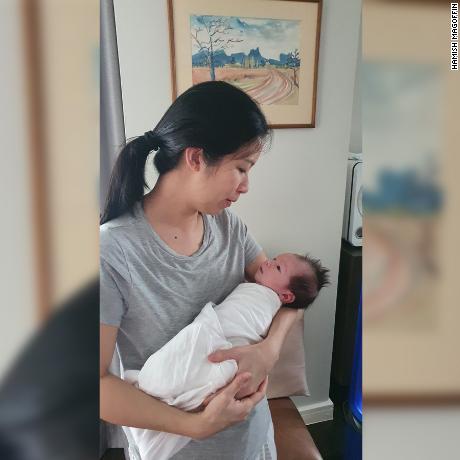Postpartum depression cost this woman and her son their lives
“She would lie down and get ready for bed, and she’d be asleep within a minute,” her husband, Hamish Magoffin, said.
Sleep took a big hit when baby Arthur was born in March 2021, though the Thailand-based family soon settled into a routine. According to Magoffin, apart from the usual stresses of having a newborn, all seemed well.
A few months in, however, Pranaiya began to struggle. Breastfeeding was a challenge, and the new mom felt she wasn’t able to give her son as much milk as he needed.
Her milk ducts kept clogging up and life turned into an endless circle of breastfeeding and pumping to secure enough milk. “She became fixated on this and started putting the pressure on herself to try and get as much breast milk as possible,” Magoffin said.
After weeks of this, the pair decided to switch to formula, assuming this would reduce anxiety levels and improve Pranaiya’s sleep. But it didn’t work.
“It was just terrible. Her sleep just unraveled,” said Magoffin, explaining that instead of getting rest his wife of four years developed insomnia.
Pranaiya became consumed with worry and found it increasingly hard to do anything.
Once an active mother, the 37-year-old struggled to get out of bed and was regularly battling dark thoughts, which eventually took over.
On September 1, less than six months after giving birth, and a month after being diagnosed with postpartum depression, Pranaiya took her life, and the life of her son Arthur.
A happy mom
Pranaiya was known to have a great rapport with kids, being referred to as “the really nice auntie” by friends’ kids.
Having her own children had not been a priority for Pranaiya, but once she and Magoffin decided to start a family, she had looked forward to becoming a mother.
Getting pregnant hadn’t been easy, but happy news of a pregnancy came in summer 2020 and their son Arthur was born in Bangkok the following year.
In those first few weeks, Pranaiya was a happy mom, according to her older sister Pongnadda ‘Pong’ Oulapathorn.
She didn’t seem to suffer from the “baby blues,” mood swings caused by sudden hormonal changes experienced by many new moms in the first weeks after birth.
But things soon changed.
Feeling out of her depth
“When she wanted to pursue anything, she would go for it, do everything by herself, and always achieve the results,” Pong said.
But when it came to motherhood, Pranaiya felt out of her depth, Pong said. She soon realized that no matter how hard she tried, things didn’t often go as planned, and this became a big source of anxiety.
“Raising a baby for the first time, not everything could be under control … breastmilk, the baby himself. The tension accumulated day by day without her recognizing it,” Pong said.
At the same time, as the coronavirus spread, Thailand went into lockdown.
“The baby was one month old, and [Pranaiya] was living in a condo with no garden and the fresh-air walks that she liked were restricted,” Pong said.
The stress that began over Arthur’s hunger didn’t…
Read More: Postpartum depression cost this woman and her son their lives



